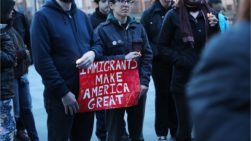Source of article The Jury Room - Keene Trial Consulting.
 You have likely heard many stories repeated about increased racial prejudice since the 2016 national elections in the US, but is there any evidence-based proof that alleged increase is real?
You have likely heard many stories repeated about increased racial prejudice since the 2016 national elections in the US, but is there any evidence-based proof that alleged increase is real?
According to a new working paper from the National Bureau of Economic Research, yes—at least when it comes to a willingness to say things aloud that have not been “okay” for a very long time. Vox has written a plain language explanation of this paper that you may want to look at to get a quick (and clear) synopsis.
Essentially, the message is that when you see leaders behaving badly, you become numb to the impact and give yourself permission to also behave badly. The researchers wondered if the results of the 2016 elections left people more likely to respond negatively to immigrants (as measured by whether they were willing to donate money to an “openly anti-immigrant” organization). The researchers did not wonder for long. There is a quote in the Vox story (from University of Kansas psychologist Chris Crandall) that is a wonderfully clear summation of what the researchers found.
Dr. Crandall says the electoral college winner did not “create new prejudices in people—not that quickly and not that broadly. What he did do is change people’s perceptions about what is okay and what is not okay”.
In a later quote, Dr. Crandall says that “it took away the suppression from the very highly prejudiced people. And those people are acting.”
(Vox also points us to Bloomberg for a more complete explanation of the research.) And then, Vox ends their article with this wonderful quote:
“We need to keep our leaders accountable for their bad behavior. If we don’t, it may not just become the norm in politics, but throughout American life.”
Here’s what happened in the research:
Before the election (according to the NBER working paper), 34% of the participants said they’d donate to an anti-immigrant organization when the donations would be made public. But 54% said they would donate if the donation were kept private.
After the election? The reluctance to make a public donation diminished with 48% saying they would donate when the donation was made public.
The researchers echo Vox (using more academic language) by saying, the election outcome did not “make these participants more xenophobic, but instead made those who were already intolerant more comfortable about publicly expressing their views”.
It’s been a few years since we’ve written about this sort of comfort in expressing highly prejudiced views. We posted about a woman in a mock trial who talked about “those Mexicans” while Black and Hispanic/Latino jurors exchanged meaningful glances. We also had a project staffed by multiple NYC attorneys who were new to Texas jurors and there was a shocked silence in the client observation room when one male mock juror made comments about a witness that were not backed up by any facts introduced into evidence.
One of the female jurors mentioned a witness seemed “depressed and beat down” and that she had been surprised by his demeanor. An older white male snorted and said, “Surprised? You’ve never been to New York City. I guarantee you, one in three business men in New York City look just like him.” The woman expressed confusion, and the man expounded further, “He’s a Jew. Now I don’t mean nothin’ bad by that.” (Our blog post from 2014.)
All the juror knew was that the witness was from New York. Religion and ethnicity—used to explain the juror’s discrediting of the witness—was both inaccurate and irrelevant. More often, bias is spoken about in code and no one says exactly what they mean. One code we’ve learned here in Texas (and almost certainly elsewhere, too) is that random references to people from “New York City” is often code for some anti-Semitic sentiment. Bias, in many forms and guises, is crucial to discern. And oddly, it is at its most insidious when the bias is completely irrelevant to the facts of the case.
We’ve seen this sort of bias expressed all across the country when people’s emotions are touched by a story (like this post from work in Arkansas). So no. It isn’t new. It’s been lurking under rocks for a while now. We repeat—this is not new. It is just that after decades of effort to create a healthier tolerance in our society we as a national society have back-slid, and it is seen as much more okay to express racism and intolerance following the 2016 elections.
Leonardo Bursztyn, Georgy Egorov, Stefano Fiorin (2017). From Extreme to Mainstream: How Social Norms Unravel. NBER Working Paper No. 23415. Issued in May 2017. http://www.nber.org/papers/w23415.

